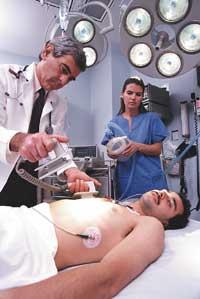An aspirin a day?
2003/11/01 Agirre, Jabier - Medikua eta OEEko kidea Iturria: Elhuyar aldizkaria

That's what the American Heart Association, almost all-powerful, says at least. In this sense, the association recommends the use of aspirin for its favorable cardiovascular effects. It seems that Americans have taken care of him, since most of the 80 million aspirin they receive daily are not to relieve everyday pain and discomfort, but to reduce the risk of heart disease.
If used correctly, this drug (acetylsalicylic acid, in short) is capable of saving lives, has very few side effects and allows doctors to better identify patients and know the real needs of their use.
For the good of the heart
Without any impediment to propaganda for aspirin, over more than a hundred years of history, this almost miraculous drug has shown that it reduces the risk of diseases such as:
- Stroke in patients who have already had another stroke or port, or a transient ischemic accident that predicts it.
- Myocardial infarction in people who have already suffered a heart attack or angina crisis.
- Problems or death after a myocardial infarction if taken when perceiving the first signs of myocardial infarction.
- Retractable blockage in people who have already intervened in by-pass or unblocked previously blocked arteries.
In short, in Spain more than 2,000 people would be saved if a year people felt the first symptoms of a heart attack took aspirin. It is also recommended to take doses of 75-325 mg once daily to prevent cardiovascular problems.
In addition, compared to aspirin, other analgesics or antithermics such as acetaminophen, ibuprofen, naproxen or ketoprofen that can compete with it do not present any advantage in cardiovascular health.
And in addition to relieving pain…

Scientists know that aspirin reduces the production of prostaglandins, which is why it is able to relieve pain, reduce inflammation or protect itself from heart attacks or stroke. Prostaglandins favor or favor the aggregation of platelets in blood, which can ultimately cause a blockage of blood vessels and, at the same time, prevent the release of oxygen from the blood to the tissues.
For example, when a clot forms in the brain, a stroke may appear. When the clot occurs in the heart, the consequence is a heart attack. The decrease in prostaglandins greatly reduces the likelihood of dangerous blood clots, myocardial infarction, and stroke.
Aspirin is an excellent, effective, economical and fairly safe medication. For so many years, in so many places and after so many people, it has become a little obsolete for many, it lacks the apparent appeal of new drugs or drugs, but if we use them correctly, it remains very beneficial and will continue to be so in the coming years. Despite its low cost, the effect of aspirin on preventing heart attacks is at least and often better than other more recent drug therapies, worth thousands of euros.
Who can aspirin benefit from?

Aspirin can do a great favor to many patients, although the experience provides us with very precarious use data. According to the American Heart Association, out of 5,000 to 10,000 people who die each year from cardiovascular disease in the U.S., if people caught an aspirin just notice the first symptoms of heart attack.
Almost all “survivors” who have had a myocardial aspirin heart attack or stroke should take it. However, although the administration of aspirin in the first moments of myocardial infarction serves as initial therapy, and this simple measure improves the subsequent prognosis, it cannot be considered as a substitute for medical care. And of course, taking aspirin should not forget to lead a healthy life.
In short, aspirin should be seen as part of the care of the doctor, within a general treatment plan for people at risk of having a heart attack or stroke.

Gai honi buruzko eduki gehiago
Elhuyarrek garatutako teknologia





